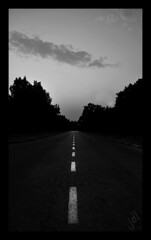 Post-apocalyptic usually breaks down into two types. In the first, catastrophe may have enveloped the earth, but new civilizations are rising from it. These societies may have contracted into subsistence-level feudalism, but their inhabitants eat two or three square meals a day and romp through old ruins where they find exotic goodies such as Swiss Army knives or flashlights or miraculously unspoiled tins of sardines. In the second, the said disaster endures, communities fracture into wandering bands of foragers, and the rare canned good may be all that stands between you and a slow death. By the time you reach the tenth page of The Road, you know which category Cormac McCarthy has chosen as his own.
Post-apocalyptic usually breaks down into two types. In the first, catastrophe may have enveloped the earth, but new civilizations are rising from it. These societies may have contracted into subsistence-level feudalism, but their inhabitants eat two or three square meals a day and romp through old ruins where they find exotic goodies such as Swiss Army knives or flashlights or miraculously unspoiled tins of sardines. In the second, the said disaster endures, communities fracture into wandering bands of foragers, and the rare canned good may be all that stands between you and a slow death. By the time you reach the tenth page of The Road, you know which category Cormac McCarthy has chosen as his own.A world pared back to basic elements. Earth and ash. Rain and snow. Cloud and cold. Always the sun-shrouding clouds and relentless cold. The man and the boy walk south on the road in the near-futile search for warmth and food. They have a revolver with only two bullets, a shopping cart filled with the fruits of their scavenging and each other. Hardly enough to survive the elements, much less the crazed cults and communes, the cannibals who pen the ill and wounded like hutch rabbits, the thieves and marauders and those sick of head and heart. But survive they must. For they are carrying the fire.
Those unfamiliar with McCarthy are in for a shock when they crack the cover. The Pulitzer-winning author loves to drop punctuation. Commas are rare, apostrophes endangered, quotation marks extinct. Sentences tend toward the short and declarative. It’s a deceptively simple style, though, with thematic riches hidden in straightforward snatches of dialogue and masterful metaphors buried in paragraphs of plain description. The same holds true for the novel’s subject matter. The Road piles on loads of detail about the pair’s attempts to scrounge for nourishment, find shelter from the elements and fight off external threats, so much so that one is tempted to dismiss it as myopic.
Only it isn’t. McCarthy wants his readers to think about more than self-treatment of wounds and tuberculosis. He wants them to consider the wonders a child’s existence can work on a parent, the meaning it imbues. He also wants them to think about God, about how humanity bears the print of the divine, about how (to borrow the novel’s diction) people carry the fire. In the very beginning, the man looks at the boy and thinks, “If he is not the word of God God never spoke.” An underdeveloped theology of revelation, for sure. Still, how many authors ordain praise from the mouths of children in a world broken beyond remedy? Precious few.
(Picture: CC 2008 by jdl_deleon)


4 comments:
There is no doubt in my mind that your review of The Road is of high quality. But I didn't read it. The Road is the next book on my list (after I finish the seven I'm currently reading) and I don't want to know anymore about it than I already do.
I promise to come back and check out your review as soon as I finish.
The Road is awesome. The most hopeful pitch-black novel I've ever read. Also short, and fast reading (though the lack of chapters really threw me off for a while. Is unhealthy to tell yourself you'll sleep at the end of the current chapter.)
Unrelatedly, I've finally gotten my hands on Smoke and Mirrors. If I don't enjoy reading it, I blame you. (And one other who recommended the volume.)
B. Nagel,
Come back and tell us what you think when you're done! McCarthy is very much an acquired taste, but The Road is probably his most-mainstream work.
CR,
Yeah, the chapter-less set-up grated at me a little. McCarthy's lack of punctuation bothers me a bit, too. For goodness sake, man, give me a quotation mark!
Like most short-story collections, Smoke and Mirrors has high and low points. It isn't a Middle Shelf book, although some of the stories made it. Some of the better selections as I remember it would be "The Wedding Present," "The Price," "Troll Bridge," "Shoggoth's Old Peculiar" and "Nicholas Was ..." Interested to hear what you think. And I will take all necessary blame.
Post a Comment